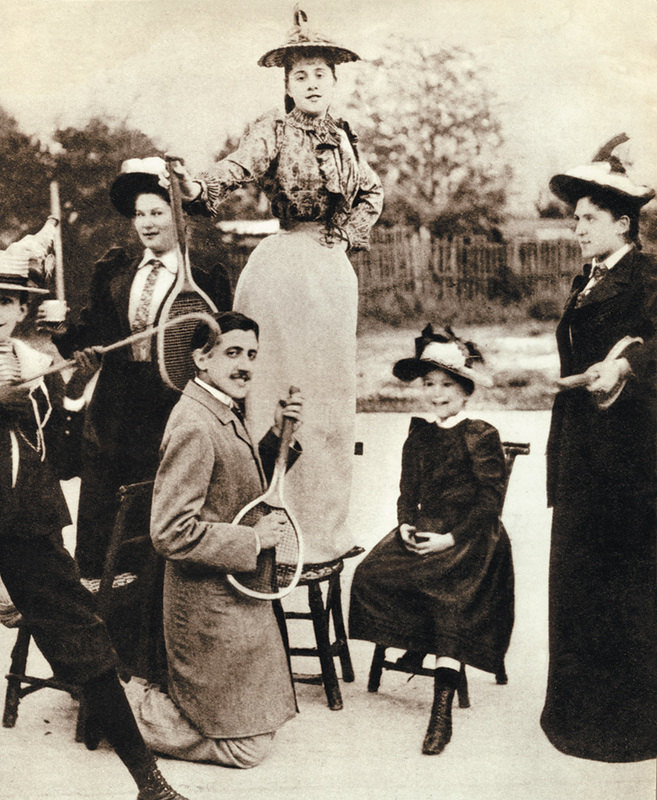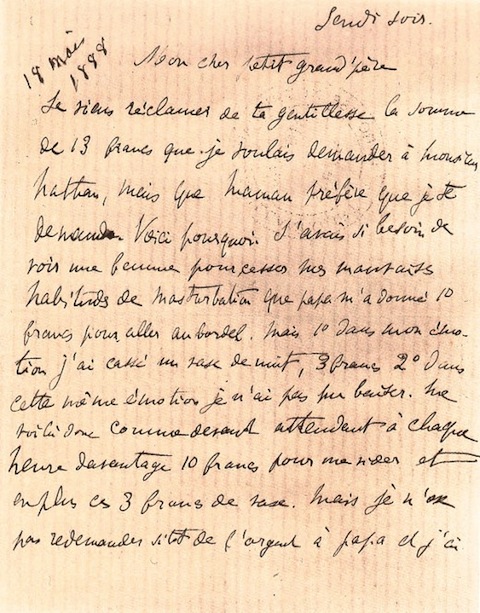Those who know the name Marcel Proust, if not his work itself, know it as that of the most solitary and introspective of writers—a name become an adjective, describing an almost painfully delicate variety of sensory reminiscence verging on tantric solipsism. Proust has earned the reputation for writing what Alain de Botton above tells us in his Proust introduction is “officially the longest novel in the world,” A la recherché du temps perdu (In Search of Lost Time). The book—or books, rather, totaling double the number of words as Tolstoy’s War and Peace—recounts the mainly contemplative travails of a “thinly veiled” version of the author. It is, in one sense, a very long, masterfully stylized diary of the author’s loves, lusts, likes, moods, and tastes of every kind.
Those who know the iPhone app, “Proust”—a far fewer number, I’d wager—know it as a game that harnesses the combined power of social networking, instant online opinion, and survey technology in a relentlessly repetitive exercise in faceless collectivity. These two entities are perhaps vaguely related by the Proust questionnaire, but the distance between them is more significant, standing as an ironic emblem of the distance between Proust’s refined literary universe and that of our contemporary mass culture.
Proust, a constitutionally fragile elitist born to wealthy Parisian parents in 1871, concluded that a life worth living requires the uniquely sensitive, finely-tuned appreciation of everyday life that children and artists possess, uncolored by the spoils of habit and deadening routine. “Proust” the game—as the host of its viciously satirical video proclaims in an ambiguously European accent—concludes “It’s fun to judge”… in identical, rainbow-colored screens that reduce every consideration to a vapid contest with no stakes or effort. It too represents, through parody, a kind of philosophy of life. And one might broadly say we all live somewhere in-between the hyper-aestheticism of Proust the writer and the mindless rapid-fire swipe-away trivializing of Proust the app.
De Botton, consistent with the mission of his very missionary School of Life, would like us to move closer to the literary Proust’s philosophy, a “project of reconciling us to the ordinary circumstances of life” and the “charm of the everyday.” As he does with all of the figures he conscripts for his lessons, De Botton presumes that Proust’s primary intent in his interminable work was to “help us” realize this charm—and Proust did in fact say as much. But readers and scholars of the reclusive French writer may find this statement, its author, and his writing, much more complicated and difficult to make sense of than we’re given to believe.
Nonetheless, this School of Life video, like many of the others we’ve featured here, does give us a way of approaching Proust that is much less daunting than so many others, complete with clever cut-out animations that illustrate Proust’s theory of memory, occasioned by his famed, fateful encounter with a cup of tea and a madeleine. The teatime epiphany caused Proust to observe:
The reason why life may be judged to be trivial, although at certain moments it seems to us so beautiful, is that we form our judgment ordinarily not on the evidence of life itself, but of those quite different images which preserve nothing of life, and therefore we judge it disparagingly.
We may take or leave De Botton’s interpretation of Proust’s work, but it seems more and more imperative that we give the work itself our full attention—or as much of it as we can spare.
Those who know the iPhone app, “Proust”—a far fewer number, I’d wager—know it as a game that harnesses the combined power of social networking, instant online opinion, and survey technology in a relentlessly repetitive exercise in faceless collectivity. These two entities are perhaps vaguely related by the Proust questionnaire, but the distance between them is more significant, standing as an ironic emblem of the distance between Proust’s refined literary universe and that of our contemporary mass culture.
Proust, a constitutionally fragile elitist born to wealthy Parisian parents in 1871, concluded that a life worth living requires the uniquely sensitive, finely-tuned appreciation of everyday life that children and artists possess, uncolored by the spoils of habit and deadening routine. “Proust” the game—as the host of its viciously satirical video proclaims in an ambiguously European accent—concludes “It’s fun to judge”… in identical, rainbow-colored screens that reduce every consideration to a vapid contest with no stakes or effort. It too represents, through parody, a kind of philosophy of life. And one might broadly say we all live somewhere in-between the hyper-aestheticism of Proust the writer and the mindless rapid-fire swipe-away trivializing of Proust the app.
De Botton, consistent with the mission of his very missionary School of Life, would like us to move closer to the literary Proust’s philosophy, a “project of reconciling us to the ordinary circumstances of life” and the “charm of the everyday.” As he does with all of the figures he conscripts for his lessons, De Botton presumes that Proust’s primary intent in his interminable work was to “help us” realize this charm—and Proust did in fact say as much. But readers and scholars of the reclusive French writer may find this statement, its author, and his writing, much more complicated and difficult to make sense of than we’re given to believe.
Nonetheless, this School of Life video, like many of the others we’ve featured here, does give us a way of approaching Proust that is much less daunting than so many others, complete with clever cut-out animations that illustrate Proust’s theory of memory, occasioned by his famed, fateful encounter with a cup of tea and a madeleine. The teatime epiphany caused Proust to observe:
The reason why life may be judged to be trivial, although at certain moments it seems to us so beautiful, is that we form our judgment ordinarily not on the evidence of life itself, but of those quite different images which preserve nothing of life, and therefore we judge it disparagingly.
We may take or leave De Botton’s interpretation of Proust’s work, but it seems more and more imperative that we give the work itself our full attention—or as much of it as we can spare.
“One can say anything so long as one does not say ‘I.’” Marcel Proust wrote these words to his fellow Frenchman of letters André Gide, and they constitute valuable advice for any novelist as well as a useful key to understanding Proust’s own work. We think of Proust — especially today, the hundredth anniversary of Swann’s Way, which opens his masterwork Remembrance of Things Past (À la recherche du temps perdu) — as an important French novelist, an important modern novelist, an important fin-de-siècle novelist, and so on. We also think of Proust as an important gay novelist. And we owe that, in some sense, to Gide, who revealed the closeted Proust’s homosexuality in their published correspondence after Proust’s death. Sexuality has since become a major element of the robust field of Proust criticism, and the letter above surely gives its scholars material — or at least those scholars willing to examine the author’s biography alongside his work.
The author of Remembrance of Things Past once suffered, according to Letters of Note, from an obsession with masturbation. “As a teenager this caused problems for his family, not least his father, a professor of hygiene, who like many of the day believed that such a worrying habit could cause homosexuality if left unchecked.” Given 10 francs by Proust père, Marcel went off to the neighborhood brothel to, in theory, get himself set straight. And the outcome of this “cure”? We defer to the sixteen-year-old Proust himself, who in the letter above tells the whole sordid story to his grandfather:
18 May 1888
Thursday evening.
The author of Remembrance of Things Past once suffered, according to Letters of Note, from an obsession with masturbation. “As a teenager this caused problems for his family, not least his father, a professor of hygiene, who like many of the day believed that such a worrying habit could cause homosexuality if left unchecked.” Given 10 francs by Proust père, Marcel went off to the neighborhood brothel to, in theory, get himself set straight. And the outcome of this “cure”? We defer to the sixteen-year-old Proust himself, who in the letter above tells the whole sordid story to his grandfather:
18 May 1888
Thursday evening.
Worth a quick note: The New York Review of Books has posted an intriguing interview with Supreme Court Justice Stephen Breyer, who reflects on an important moment in his intellectual life — reading Marcel Proust’s À la recherche du temps perdu (In Search of Lost Time) for the very first time … in French. Decades ago, while “working as a legal intern at an American law firm in Paris,” Breyer needed to improve his French. Reading through all seven volumes of Proust’s monumental work seemed like a good way to do it. 3,500 pages and 1.5 million words later, Breyer finished. And then he re-read them again. The first volume of the long novel, Swann’s Way, was published 100 years ago, in 1913. Asked why he still cherishes Proust’s work so much, Breyer had this to say:
It’s all there in Proust—all mankind! Not only all the different character types, but also every emotion, every imaginable situation. Proust is a universal author: he can touch anyone, for different reasons; each of us can find some piece of himself in Proust, at different ages…. What is most extraordinary about Proust is his ability to capture the subtlest nuances of human emotions, the slightest variations of the mind and the soul. To me, Proust is the Shakespeare of the inner world.
You can read the full interview at NYRB, which gets into to some fascinating questions, like Why is literature crucial to a democracy? and Does reading the US Constitution having anything in common with reading a great literary work?
It’s all there in Proust—all mankind! Not only all the different character types, but also every emotion, every imaginable situation. Proust is a universal author: he can touch anyone, for different reasons; each of us can find some piece of himself in Proust, at different ages…. What is most extraordinary about Proust is his ability to capture the subtlest nuances of human emotions, the slightest variations of the mind and the soul. To me, Proust is the Shakespeare of the inner world.
You can read the full interview at NYRB, which gets into to some fascinating questions, like Why is literature crucial to a democracy? and Does reading the US Constitution having anything in common with reading a great literary work?

